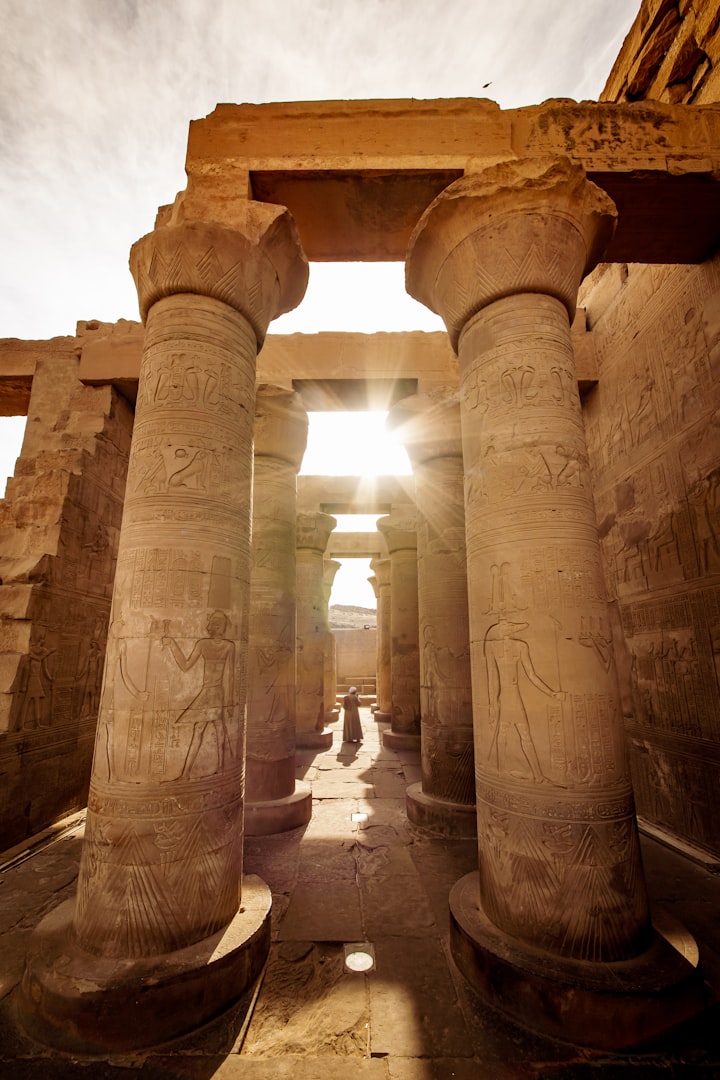Ages Past
A Historical Fiction Short Story

Kha, Head Archeologist of Ptolomy IV, carefully brushed off the stone tablet he had just unearthed, engraved with heiratic script. Nearby, a Blot of Scribes sat under a shade, recording the findings in both Egyptian and Greek, to be archived and studied in the Great Library at Alexandria. More, armed with wax tablets and styles rather than papyrus and brushes, were scattered around the dig site, taking notes as the scientists dictated.
A little further away, a sudden cry came from Alexander, named for the Conqueror who had thrown off the yoke of the Persian Invaders, and Kha's colleague. Kha looked over, alarmed, but the other man was smiling, so it must have been a cry of triumph. It was often hard to tell, with Alexander.
One didn't get rid of the Persians without also gaining the Ptolomies, Kha supposed, and there were worse flaws for a man to have than a tendency toward indistinguishable excitability.
He put down the stone tablet and hurried over. "What is it?"
Alexander ignored the glare aimed at him from one of the scribes, who had startled at the initial shout and nearly drawn a streak across his papyrus, waving the clay shard with the faded markings. "Mycenean! You were right, my friend, they did trade this far south!"
Kha would never publicly admit to the warm glow that filled him at his friend's proclamation. The Egypt of the Ancient Pharaohs, of the Old and Middle and New Kingdoms, of the time when the land was divided into Upper and Lower before Namor united the two, may have faltered a few hundred years ago, replaced by a fusion of Egyptian and Macedonian Greek, scattered with a few fading remnants of Persian influence, but she shadows of the greatness that had lasted thousands of years still lingered, if one knew where to look. The ever-shifting sands of the desert and burial sites of the wealthy and powerful concealed the secrets and treasures of ages, just waiting to be discovered.

Truly, it was amazing what could be found in what had been the rubbish heap of an Old Kingdom Trader, in what was now merely a small port town at the mouth of the Nile where it met the Mediterranean.
Berenike, one of the rarer female scholars, was carefully pouring a mixture of water and chemicals over brown leathery strips of what had once been food scraps, dried out and preserved by time and the desert heat. It was a new procedure, one which Berenike hoped would reconstitute them into something identifiable. Kha knew better than to offer to help with the pithos; those deceptively slender arms were stronger than they looked, and Berenike wasn't afraid to throw a punch at any man who tried to tell her she had no place on a dig site.
Laid out on yet another bench, as a group of students argued over how to organise them, were rags that had once been complete sets of clothing, beads that were now almost hidden in clumps of sandstone, fragments of woven baskets and clay pots and reed sandals. Pottery shards and unfired clay tablets sat nearby, notes scrawled on them in a variety of languages, and a small stone tablet inscribed with something similar to the early Phonecian alphabet, perhaps Sumerian.
From what Alexander had translated so far, stifling giggles the entire time until Berenike was ready to strangle him if he didn't explain himself, the smaller tablet was a copy of a letter of complaint, regarding low-quality copper from the Ur region at exorbitant prices, and a statement on the character of the copper merchant himself.
The long-dead merchant had clearly been very passionate on the subject, to have kept a copy for himself as well as going to the expense of inscribing a stone tablet to complain to this Ea-Nasir, such a long distance away. Were there more such tablets, scattered around the world with other merchants, perehaps at the bottom of the sea in the cargo of sunken ships? Had Ea-Nasir himself, whoever he was, stored the angry letters, either carefully hidden as a mark of shame and determination to do better, or in a place of pride, secure in the knowledge that he was too far away for them to do more than write complaints to him?
Kha regretted that he would never know, but took comfort in the fact that perhaps some future Archeologist or Historian would find out.

They left guards around the dig at night.
It was unlikely that any enterprising thieves would see much value in the day's discoveries, but who knew what kind of damage might be done to the fragile artifacts? Tossed around as the brigands searched for something that could be sold; broken or torn or shattered beyond repair by careless hands that knew not what they held? It was worth the cost of hiring men to keep a watch.
This was not the Pyramids, Ancient structures centuries before Kha had been born, or a Tomb of Kings, filled with treasure and traps, after all. The true value of all that they found was in the increased knowledge of Egypt's earliest history, not in monetary value of pretty trinkets sold to greedy collectors wishing to boast to their friends or hoard it for themselves.
Hence, the guards, well-paid enough that they would not accept bribes, and so thoroughly sick of listing to Kha and his associates enthuse over their discoveries that they would complain about how worthless it all was to anyone who would listen over a jar of beer at the tavern.
Of course, even the guards would need time to work their way through every tavern. The dig was on the outskirts of a port city, after all, and the city was built like most of its kind that dotted the coastlines. Two taverns for every temple, and two brothels for every tavern.
The civil engineers who had designed the city, long ago, knew who the majority of travelers would be, and planned accordingly.
Ra's sunboat - or Apollo's chariot, as Alexander insisted - began to sink below the horizon, and Kha stretched, packing up his tools and making sure everything was secure before they left for the night.
When Ra returned from battling Apophis, it would be a new day, rife with new discoveries to be unearthed.

By the time of the fall of Egypt to Emperor Augustus Ceaser and the death of Cleopatra VII, Egypt had already existed for more than 3000 years, longer than the time from then until the modern day, and long enough that the later Pharaohs had archeologist exploring their own "More Ancient" History.
The mind boggles.
About the Creator
Natasja Rose
I've been writing since I learned how, but those have been lost and will never see daylight (I hope).
I'm an Indie Author, with 30+ books published.
I live in Sydney, Australia






Comments
There are no comments for this story
Be the first to respond and start the conversation.